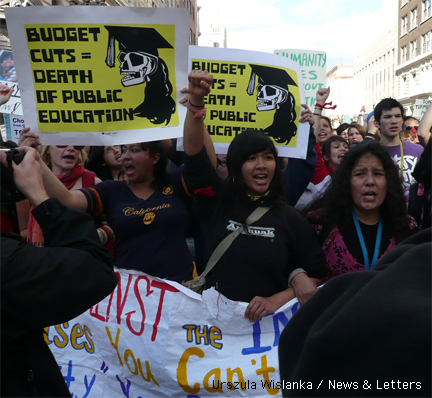|














|
|
|
NEWS & LETTERS, September-October 2011
Essay
Needed: debate on education in era of cutbacks
by Erica Rae
From college level all the way down to pre-school, education is in crisis across the U.S. Teachers are made the scapegoats for why students are not "measuring up" to keep our country competitive in a global market that is falling apart across the globe. But, what is the reality?
At the college level: many students are facing unemployment and are moving back with their parents. The average student is starting off adult life approximately $30,000 in debt, $24,000 due to educational loans. Close to 20% of college seniors carry monthly credit card balances greater than $7,000 and can easily slip into debt, destroying their credit ratings for life and the ability to use credit to secure basic needs like an apartment or a car. In Chicago, where I live, two-year city colleges have among the lowest graduation rates in the nation. Of the seven city colleges, Harold Washington holds the highest rate with 9.8% of its students actually making it to graduation. Olive-Harvey has the lowest rate with 3.3%.
 At the high school level: the recent Programme of International Student Assessment comparing 34 countries, shows the U.S. ranks 14th in reading, 17th in science and 25th in math. The focus of this assessment is not memorization of facts, but the application of acquired knowledge to problem solving. At the high school level: the recent Programme of International Student Assessment comparing 34 countries, shows the U.S. ranks 14th in reading, 17th in science and 25th in math. The focus of this assessment is not memorization of facts, but the application of acquired knowledge to problem solving.
At the grade school level: "60 Minutes" recently shined the spotlight on the impact of poverty on the education of homeless students. Based on our own government projections of unemployment, the poverty rate for children in this country will soon hit 25%. Those children will be the largest U.S. generation to be raised in hard times since the Great Depression. Many go to bed hungry and cannot sleep because their stomachs hurt from lack of food.
During the last five years in Illinois everything imaginable has been cut, cut, cut from education funding. What is left? School buses! Because of the cuts in transportation funding nationally, the delays from the state in reimbursing school districts, and the increased cost of gas, the state is now considering doing away with bus service in various districts. State officials recently told many superintendents that they may not receive final reimbursement for the past year's transportation costs until the end of this year.
Many districts are delaying the purchase of new buses to replace many that are questionable, including some that have logged over 140,000 miles. As a result, many students will lose their school buses and/or walk farther, and have to go through dangerous neighborhoods, and unsafe intersections on their own. Those who do get picked up will be on buses longer (right now the limit is one hour each way, including kindergarten children), and suffer overcrowding as more students will be jammed on each bus.
In a show of parent support for teachers, one mother of a fourth grade student in Will County, who sits on her district's transportation committee, said, "I'm not a fan," when asked about cutting the bus service in a rural area where there are limited sidewalks for her son to walk on, "but if they're firing a music and an art teacher, just so I can have a bus, that doesn't make sense to me."
HOW DID IT GET SO BAD?
The beginning of the crisis in education started a generation ago when then President Ronald Reagan began serious cuts in education and social services. That was furthered by the first George Bush. With the institutionalization of "No Child Left Behind" under the second George Bush, the entire educational system was thrown into chaos. Triggering a maze of paperwork and lack of organization, this was a direct attack on poor school districts where suddenly everything from teacher salaries, to textbook selection, to non-union charter schools, to for-profit institutions of higher learning, to standardized "testing, testing, testing" of anything that moves, threw the entire educational system into complete disarray.
A generation of research in the field of early education, emphasizing the need for developing critical thinkers to address the serious problems our world faces, was thrown out in favor of creating a hatred of reading and reducing literacy to knowing the letters of the alphabet and their corresponding sounds.
Scientific study of evolution going back to Darwin was thrown out in favor of "intelligent design." Prayer was brought back into the public school system. Funding was taken away for school lunch programs, after-school programs--which literally saved children's lives in dangerous neighborhoods--field trips, capital campaigns to fix collapsing buildings, scholarships for minority students (who have become the majority in public schools), forget about the immigrant and second language learning community, physical education, art, music, and special education programs... the list goes on and on.
With the election of President Barack Obama there was a sense of hope in many people, including teachers. But with the installment of Arne Duncan as the Secretary of Education and the focus on "Race to the Top," progressive people in the field of education believe we're looking at a wolf in sheep's clothing.
 The fundamental problem with "Race to the Top" is that it is based on a capitalist economic model applied to the field of education. Educational funding is based on competition. In a speech to the National Urban League in July 2010, Obama said that that program was the "most important thing he had done in office." But there was scathing critique from many of the nation's leading civil rights organizations, such as the NAACP. New York University History Professor Diane Ravitch had this to say: The fundamental problem with "Race to the Top" is that it is based on a capitalist economic model applied to the field of education. Educational funding is based on competition. In a speech to the National Urban League in July 2010, Obama said that that program was the "most important thing he had done in office." But there was scathing critique from many of the nation's leading civil rights organizations, such as the NAACP. New York University History Professor Diane Ravitch had this to say:
Evaluating teachers in relation to student test scores will have many adverse consequences. It will make the current standardized tests of basic skills more important than ever, and even more time and resources will be devoted to raising scores on these tests. The curriculum will be narrowed even more than under George W. Bush's No Child Left Behind, because of the link between wages and scores. There will be even less time available for the arts, science, history, civics, foreign language, even physical education. Teachers will teach to the test. There will be more cheating, more gaming the system... (Huffpost Politics, "Obama's Race to the Top Will Not Improve Education," Aug. 1, 2010).
Earlier this summer, there was a great deal of fanfare in Illinois, as Senate Bill 7 was signed into law by Governor Quinn. It was hailed as a "model" of cooperation and good will that the whole country could follow. We heard of the wish to "not have all the drama" that happened during the Wisconsin winter. At the table for this heavenly collaboration were state legislators from the right and left, the Chicago Teachers' Union, the National Education Association, the Illinois Education Association, the Illinois Federation of Teachers, the new mayor of Chicago, community activists, parents, etc. The goal was focused on the best interests of children. Everyone would be an equal partner and move forward in educational harmony and a spirit of good will.
But then, details started to emerge: a 75% "yes" vote to strike is now required from the entire union membership; a 4% raise for Chicago teachers is gone; tenure is gone; pensions are gone; healthcare premiums will increase; longer school days will be mandated; home visits will be mandated for all teachers (whether traveling alone to safe neighborhoods or crack houses); the school year will be extended; a five-year performance contract focused on student test scores will be established for teachers, and will provide the basis for raises, tenure, and dismissal.
The icing on the cake was when the Chicago Board of Education, on June 22, voted to give the new CEO, Jean-Claude Brizard, a salary of $250,000. The Board approved the highest salaries ever for Chicago Public School (CPS) administrators. This was done while the CPS system enjoys a $720 million deficit. The Illinois budget for the coming year, adopted by the legislature, is $3 billion less than that requested by Governor Quinn. This resulted in an immediate reduction of $200 million in funding for pre-K-12 programs across the state in 2011-12. This was on top of an additional loss of $415 million in federal funding. This is the "model" that Illinois wants to present for the rest of the nation to follow?
THE ARAB SPRING AND CHICAGO SUMMER
The Arab Spring burst onto the scene and galvanized many across the world hoping for a new way of life. It helped inspire those in Wisconsin who took matters into their own hands and held the state capitol and government at bay for weeks, opposing a move, spearheaded by Governor Scott Walker, to set the clock back on all labor unions, especially teachers, who he claimed are known to be "troublemakers."
We Illinois teachers wonder whether we will experience the first teachers' strike since 1995. There is much debate. Some of us talk of forcing a re-opening of the contract on certain pertinent issues; of more sacrifices and belt tightening needed by everyone and that extending the school day will only benefit the children; of broadening the discussion so that a strike is not merely called over the take-back of a 4% raise and the gutting of a pension plan but the attack on labor nationwide. Others of us talk of the hard work of teachers to form relationships with the families of the children they teach and community organizations so that parent/community support for a teacher's strike will be stronger.
One retired teacher talked of teachers being made scapegoats for all of society's ills and said, "Teachers need a new strategy to re-establish themselves as professionals rather than just accepting the definition of a management-worker relationship." One columnist and former Board of Education member from the Kent (Ohio) Ravenna Record-Courier said:
Controlling our common schools down from a corporate top, up from a budgetary bottom line, or sideways by slandering and mistrusting one another is not democracy and it is not sustainable. If we as citizens, school boards and unions are not all at the table where decisions are made about our schools, our children and communities will be lunch for the rich and powerful.
Under capitalism, the meaning of what is defined as education has been narrow: you go to school, take tests, memorize, take more tests, get good grades, do this many more times, maybe get a job making a decent wage, pay taxes, and then you die. Occasionally, new ways in thinking about education rise to the top, such as with the Paris Commune or what is struggling to happen within the Middle East. Discussing new ideas in education through News & Letters is critical, not just as blips on the radar screen of history but as long-term reality where "education" promotes the development of students, from early childhood to old age, and will not separate the individual human being from the community and world in which s/he lives.
|

* * *

Subscription for one year
$5
|

